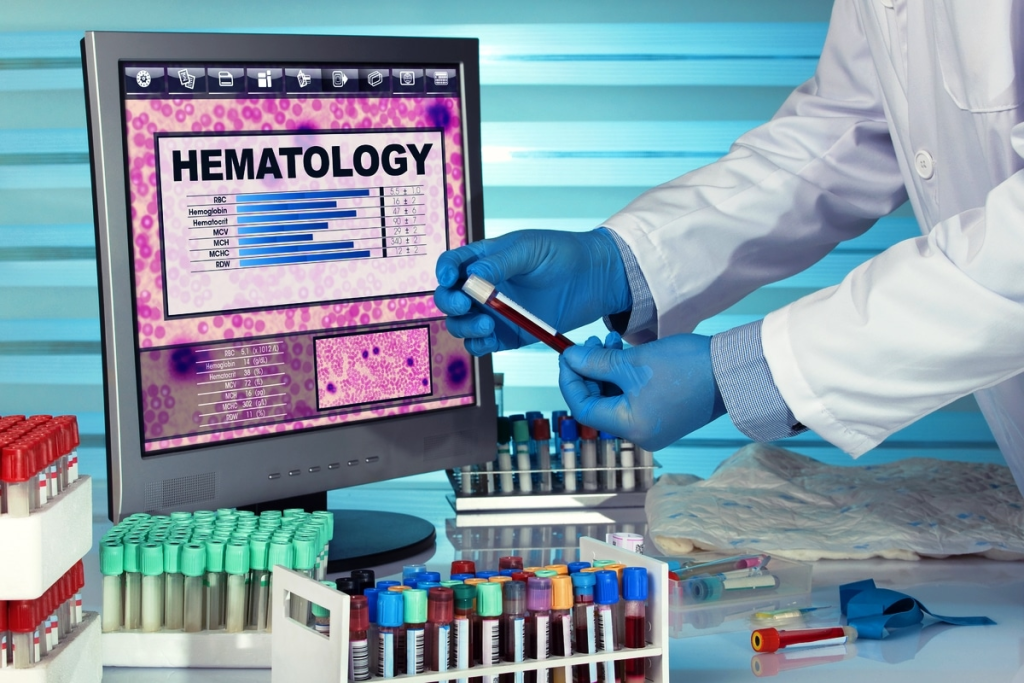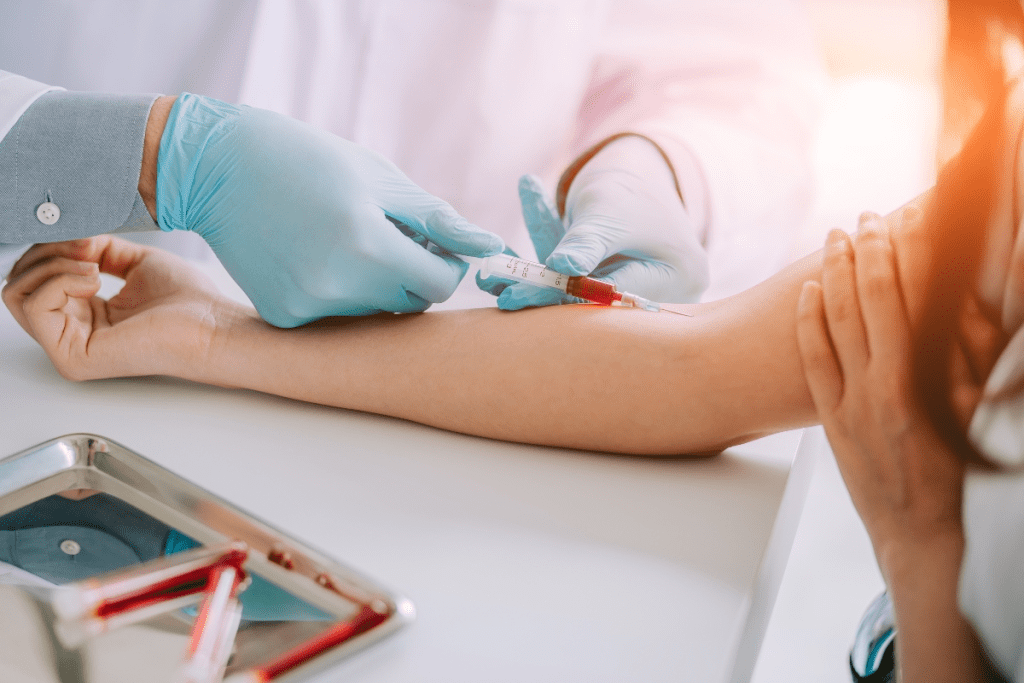Last Updated on October 21, 2025 by mcelik

Being referred to a blood specialist can worry many patients. A referral to hematology doesn’t necessarily mean you have a serious condition. It’s a step towards diagnosing and treating conditions related to your blood and lymphatic system.
We know the uncertainty can be unsettling. Hematology is a branch of medicine that deals with blood and lymphatic system disorders. A blood specialist, also called a hematologist, is a medical doctor who specializes in this field.
In this article, we will explore the common reasons for hematology referrals. We will also talk about what to expect during your first hematology appointment.
Hematology is a key part of medicine that focuses on blood disorders. It studies blood cells and proteins involved in bleeding and clotting. Knowing about hematology helps us see how blood health affects our overall well-being.
Hematology is the study and treatment of blood disorders. It covers many conditions, from anemia to blood cancers. Hematologists use tests and treatments to help patients.
Hematologists study blood diseases and how to manage them. They understand blood cell production and clotting. They work with other doctors to care for patients with blood issues.
Blood health is essential for our body’s function. It carries oxygen, fights infections, and aids in healing. Blood disorders can cause serious health problems.
Good blood health means regular check-ups and screenings. Early detection helps in better treatment. Hematologists are key in managing blood-related conditions.
A blood specialist, or hematologist, is key in diagnosing and treating blood disorders. They are medical doctors with deep training in blood diseases and disorders.
Hematologists go through a lot of education and training. They first complete medical school. Then, they do a residency in internal medicine and a fellowship in hematology.
This training gives them the skills to handle complex blood disorders.
The education and training process for hematologists includes:
Hematologists are different from other medical specialists because they focus on blood disorders. While oncologists treat blood cancers, hematologists handle a wider range of blood issues. This includes bleeding and clotting disorders, anemia, and more.
| Specialist | Area of Focus |
| Hematologist | Blood disorders, including bleeding and clotting disorders, anemia, and blood cancers |
| Oncologist | Cancer, including blood cancers |
| Primary Care Physician | General health, including initial diagnosis and referral to specialists |
Blood specialists deal with many conditions. These include:
Understanding what hematologists do helps patients appreciate their care for blood-related issues.

Getting a referral to a hematologist can be reassuring and informative. It usually happens when you need specialized care for blood disorders or conditions.
Abnormal blood test results are a common reason for a referral. Blood tests help doctors find many health issues. If your doctor sees unusual results, they might send you to a hematologist for more checks.
Blood cell disorders are another big reason for referrals. These disorders affect red, white blood cells, or platelets. They can cause anemia, infections, or bleeding disorders. Hematologists are experts in treating these issues.
Bleeding and clotting disorders, like hemophilia or thrombophilia, need a hematologist’s help. These conditions can really affect your life. Hematologists know how to manage them, helping patients get better care.
Primary care doctors send patients to hematology for many reasons. They do this when they think a condition needs special knowledge. By doing this, they make sure patients get the right care for their needs.
Seeing a hematologist starts with a referral. This is key in the US healthcare system. A primary care doctor refers patients to a hematologist when needed.
In the US, referrals start with a primary care doctor. They check if a patient needs specialist care. If yes, they refer the patient to a hematologist.
Key steps in the referral process include:
A hematology referral includes important patient info. This includes medical history, current symptoms, and test results. It helps the hematologist understand the patient’s needs.
The referral documents may contain:
Understanding insurance is vital in the referral process. Patients must check if their insurance covers hematologist visits and tests. Insurance affects the specialist choice and care cost.
Patients should:
Getting a referral to hematology can worry many patients. But, not all referrals mean a serious problem. Hematology studies blood disorders, from mild to severe.
Blood disorders vary in severity and impact. Conditions like anemia, bleeding, and clotting disorders are common. Knowing this helps patients understand their referral.
The spectrum of blood disorders includes simple and complex conditions. For example, iron deficiency anemia is often treated with diet and supplements.
Not all hematology referrals are for serious issues. Some are for preventive or diagnostic reasons. Preventive referrals might be for those with a family history or risk factors.
Diagnostic referrals happen when a doctor needs more tests. This is often due to abnormal blood test results.
| Reason for Referral | Description | Example |
| Preventive | For individuals with risk factors or family history | Family history of bleeding disorders |
| Diagnostic | To investigate abnormal test results | Abnormal complete blood count (CBC) |
| Suspected Condition | When a specific blood disorder is suspected | Suspected anemia or leukemia |
Not all hematology referrals are serious. But, some symptoms like unexplained bleeding or severe fatigue are concerning. These could mean a blood disorder that needs quick attention.
Seeing a hematologist is a proactive step. It helps get a correct diagnosis and treatment plan.
Seeing a hematologist doesn’t always mean you have cancer. Hematologists are doctors who deal with blood disorders. These can include cancer, but not all of them.
Hematology and oncology are related but different. Hematology studies blood and blood disorders. Oncology focuses on cancer. But, blood cancers are part of hematology, so there’s a big overlap.
Many hematologists also know a lot about oncology. And vice versa, for blood cancers. But, not all visits to a hematologist are because of cancer.
There are many reasons to see a hematologist that aren’t cancer. Some include:
These conditions can really affect a person’s life. They need special care from a hematologist.
Hematologists and oncologists often work together, even for blood cancers. Some doctors are both hematologists and oncologists. They can handle complex blood disorders, including cancers.
These experts can diagnose and treat many blood-related issues. They know a lot about both hematology and oncology. This helps them give better care to their patients.
Knowing what hematologists do can help patients feel less scared. It’s good to understand why you might see one.
Getting ready for your first visit with a hematologist can ease your worries. It’s a big step, but knowing what to expect can help a lot.
Before you go, collect all your medical records. This means:
Having this info ready helps your hematologist understand your situation better. It makes your visit more effective.
At your first visit, you might have several tests to find out what’s going on. Some tests you might have include:
| Test/Procedure | Purpose |
| Complete Blood Count (CBC) | Looks at different parts of your blood, like red and white cells |
| Blood Smear | Checks the shape of your blood cells for any problems |
| Bone Marrow Biopsy | Takes a sample of bone marrow to see how it’s working |
These tests are key to figuring out your blood health and finding the right treatment.
You’ll likely have questions during your visit. It’s a good idea to write them down, like:
Asking the right questions helps you understand your health better. It makes you feel more in charge of your care.
Your first visit with a hematologist usually lasts 30 minutes to an hour. It usually includes:
Knowing what your appointment will cover helps you feel more ready. It makes the most of your time with your hematologist.
Getting a correct diagnosis is key to treating blood disorders well. Hematologists use many tests to figure out what’s wrong. This helps them plan the best treatment.
Blood tests are a basic tool in hematology. They check the levels of red, white blood cells, and platelets. This helps spot issues like anemia, infections, and leukemia.
Tests like the Complete Blood Count (CBC) and blood smears are common. They show how different blood cells are doing. This info helps doctors decide what to do next.
| Blood Test | Purpose | Information Provided |
| Complete Blood Count (CBC) | Measures levels of different blood cells | Helps diagnose anemia, infection, leukemia |
| Blood Smear | Examines morphology of blood cells | Provides detailed information about blood cell abnormalities |
A bone marrow biopsy takes a sample from the bone marrow. It’s key for finding blood disorders like leukemia and lymphoma.
To get the sample, a needle is put into the hip bone. Then, the sample is checked under a microscope for any odd cells.
Hematologists also use new methods to diagnose blood disorders. These include looking at genetic material for mutations.
Other methods like flow cytometry and cytogenetic analysis are used too. They help find and understand different cell types and chromosomal issues. This info helps doctors tailor treatments.
By using all these tests, hematologists can accurately diagnose and treat blood disorders.
Hematologists are key in diagnosing and treating blood disorders that affect millions. These disorders can greatly impact a person’s life. So, getting the right medical care quickly is very important.
Anemia means not enough red blood cells, making it hard for tissues to get oxygen. Hematologists deal with different types of anemia. They find the cause and suggest diet changes or supplements like iron or vitamins.
Bleeding disorders, like hemophilia, make it hard for blood to clot. This leads to too much bleeding. Hematologists use tests to find these disorders. They might give clotting factor replacements or preventive treatments before surgeries.
White blood cell disorders can cause infections or autoimmune diseases. Hematologists treat these, like neutropenia or leukemia. They use medicines or stem cell transplants, depending on the disorder.
Platelet disorders can cause bleeding or clotting problems. Hematologists test for these through blood and bone marrow exams. Treatment varies based on the cause, like medicines to help platelet levels.
Knowing about blood disorders helps patients see how important hematologists are. They help manage these conditions with a mix of medical knowledge and care for the patient.

The United States has many top hematology centers. They offer the latest care for blood disorders. These centers have the best technology and teams of experts.
It’s normal to feel worried when you get a referral to a hematologist. This worry can range from a little concern to a lot of anxiety. You might wonder what it means for your health.
First, try to understand why you’re feeling anxious. It’s important to know that your feelings are real and okay. Acknowledging your emotions is the first step to dealing with them.
Getting ready for your appointment can help lower your anxiety. Being informed about what to expect is very helpful.
Being prepared can really help reduce your anxiety. Knowing what to expect makes you feel more in control.
If your anxiety is really affecting your life, you might need more help. If you’re finding it hard to manage your anxiety, talking to a mental health professional could be a good idea.
Resources for additional support include:
Getting a hematology referral is a big step in your health care journey. By understanding your feelings, preparing for your appointments, and knowing when to ask for help, you can handle the anxiety that comes with it.
Getting a diagnosis of a blood disorder can change your life. It’s not just about the medical side. It’s about adjusting to a new reality that touches many parts of your life.
The first time you hear you have a blood disorder, you might feel shocked, scared, or even relieved. This is a key time to start understanding your condition. It’s important to ask questions and look for reliable information.
Adjusting to a diagnosis means several steps:
Support groups are very important when you live with a blood disorder. They let you share your story, get emotional support, and learn from others facing similar issues.
Some great resources include:
Managing a blood disorder long-term means medical care, lifestyle changes, and regular check-ups. Finding the right balance is key for each person.
Some long-term management tips are:
Living with a blood disorder is a journey that needs patience, strength, and support. By understanding your condition, using available resources, and managing it well, you can live a happy life.
Getting referred to a hematologist can be scary, but knowing about hematology helps. We’ve covered what hematology is, why you might need a referral, and what to expect at your first visit.
Learning about hematology makes it easier to deal with referrals. This ensures you get the best help for your blood issues.
Don’t worry too much about a hematologist referral. Often, it’s a smart move to find and treat blood problems early. We hope this info has made you feel more at ease and ready to take charge of your health.
A hematologist is a doctor who deals with blood-related issues. They diagnose, treat, and manage blood disorders.
Your doctor might send you to a hematologist if your blood tests show something odd. This could be due to a blood cell disorder or a problem with bleeding or clotting.
No, seeing a hematologist doesn’t mean you have cancer. They handle many blood disorders, not just cancerous ones.
At your first visit, expect a detailed medical history and physical check-up. You might also have some tests, like blood tests or bone marrow biopsies.
To get ready, collect any medical records you have. Write down your symptoms and questions. Be ready to talk about your health history.
Hematologists deal with many blood issues. These include anemia, bleeding disorders, and problems with white blood cells or platelets.
A hematology appointment can last from 30 minutes to several hours. It depends on how complex your case is and what tests you need.
Yes, often you need a referral from your primary care doctor. This is true, even if you’re seeing a specialist outside your insurance network.
Hematologists focus on blood disorders, while oncologists deal with cancer. But, hematologist-oncologists can handle both blood issues and cancer.
To find a hematologist, ask your primary care doctor for a referral. You can also check your insurance for in-network specialists or search online.
Subscribe to our e-newsletter to stay informed about the latest innovations in the world of health and exclusive offers!